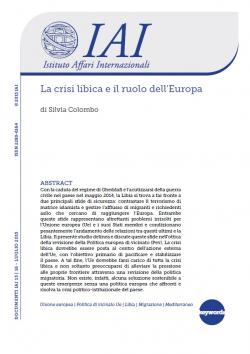La crisi libica e il ruolo dell'Europa
Since the fall of the Gaddafi regime and the spiralling of the civil war in the country from May 2014 onwards, Libya has been faced with two main security challenges: countering Islamic terrorism and managing the influx of migrants and asylum seekers attempting to reach Europe. Both these challenges represent unresolved issues for the European Union (EU) and its Member States, and weigh heavily on the progress of relations between them and Libya. This paper outlines and discusses these challenges in view of the revision of the European Neighbourhood Policy (ENP). It argues that the Libyan crisis should be at the heart of the EU's external action, with the primary objective of bringing peace and stabilising the country. To this end, the EU should take charge of all the Libyan crisis and not just worry about relieving the pressure at its borders through a review of its migration policy. There is no sustainable solution to these emergencies without a European policy that addresses and solves the political and institutional crisis in the country.
Paper prepared for the Istituto Affari Internazionali (IAI) in the framework of the “Citizens’ Dialogues” initiative promoted by the Representation of the European Commission in Italy. An earlier version has been presented at the seminar “La politica europea di vicinato in crisi? Il caso Libia e il futuro delle relazioni con il Mediterraneo”, held in Catania on 2 July 2015. The seminar has been organised by the EC Representation in Italy, the Jean Monnet Chair ad personam (ReSHAPE) of the University of Catania and the Istituto Affari Internazionali (IAI).
-
Details
Roma, IAI, July 2015, 14 p. -
In:
-
Issue
15|16
1. Il difficile rapporto tra l’Ue e la Libia: alcune considerazioni
2. I nodi cruciali
2.1 La crisi politico-istituzionale
2.2 La minaccia del terrorismo islamista
2.3 L’emergenza migratoria
3. Il futuro della Libia e il ruolo dell’Europa



